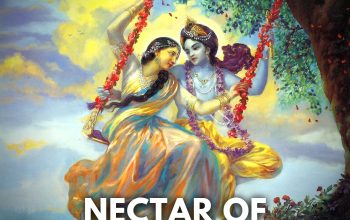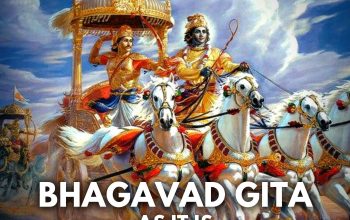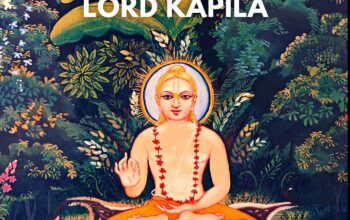This is one of the main Upanishads, a part of sruti section of the Vedas. If I would have written this description before recording the podcast I’d probably say “such high philosophical subject matters may not be easy to comprehend for the uniformed general population …” but no, this book was actually the most popular so far. I’m very glad I have such an intelligent audience! This book is also a part of the Bhakti-sastri degree, it defines Vedic perspective on the nature and qualities of the Absolute Supreme Lord, the living entity, what is knowledge and nescience and how to properly elevate oneself to meet the Lord face to face. The closer we are to God – the more we are the best version of ourselves, complete and perfect in our own individual way. And the more we go away from him – the more we are atma-ha, killing our souls.
Episodes playlist 126-146

Reading books by Srila A.C. Bhaktivedanta Swami Prabhupada daily. Each of these books is a literary masterpiece, they have all the answers to any questions of life and everything necessary to uplift and nourish our soul, develop our loving relationship with God, Krishna, and help us relish our adventurous spiritual journey. Such a deep, bonafide, theological science based on Vedic scriptures has never been presented like this before. Chant Hare Krishna, dive into these books, be happy and make others happy! From Mayapur with love, Your humble servant, Sulalita devi dasi
“Vedic injunctions cannot be interpreted. But ultimately, if you carefully study why these injunctions are there, you will find that they are all correct. The Vedas are not compilations of human knowledge. Vedic knowledge comes from the spiritual world, from Lord Kṛṣṇa. Another name for the Vedas is śruti. Śruti refers to that knowledge which is acquired by hearing. It is not experimental knowledge.” | Link to get your own copy or read online will be up tomorrow! | Find us on social media: Facebook “Sravanam Diaries” | Instagram & Tumblr @sravanamdiaries | Email: sravanamteam@gmail.com

One of my favorite quotes
[frontpage_news widget=”115″]Śrī Īśopaniṣad | Mantra 11
vidyāṁ cāvidyāṁ ca yas
tad vedobhayaṁ saha
avidyayā mṛtyuṁ tīrtvā
vidyayāmṛtam aśnute
TRANSLATION
Only one who can learn the process of nescience and that of transcendental knowledge side by side can transcend the influence of repeated birth and death and enjoy the full blessings of immortality.
Purport: […] There is no question of stopping activities, just as there is no question of wiping out one’s temperature altogether when trying to recover from a disease. “To make the best use of a bad bargain” is the appropriate expression. The culture of spiritual knowledge necessitates the help of the body and mind; therefore maintenance of the body and mind is required if we are to reach our goal. The normal temperature should be maintained at 98.6 degrees, and the great sages and saints of India have attempted to do this by a balanced program of spiritual and material knowledge. They never allow the misuse of human intelligence for diseased sense gratification.
Human activities diseased by a tendency toward sense gratification have been regulated in the Vedas under the principles of salvation. This system employs religion, economic development, sense gratification and salvation, but at the present moment people have no interest in religion or salvation. They have only one aim in life—sense gratification—and in order to achieve this end they make plans for economic development. Misguided men think that religion should be maintained because it contributes to economic development, which is required for sense gratification. Thus in order to guarantee further sense gratification after death, in heaven, there is some system of religious observance. But this is not the purpose of religion. The path of religion is actually meant for self-realization, and economic development is required just to maintain the body in a sound, healthy condition. A man should lead a healthy life with a sound mind just to realize vidyā, true knowledge, which is the aim of human life. This life is not meant for working like an ass or for culturing avidyā for sense gratification.
The path of vidyā is most perfectly presented in Śrīmad-Bhāgavatam, which directs a human being to utilize his life to inquire into the Absolute Truth. The Absolute Truth is realized step by step as Brahman, Paramātmā and finally Bhagavān, the Personality of Godhead. The Absolute Truth is realized by the broadminded man who has attained knowledge and detachment by following the eighteen principles of the Bhagavad-gītā described in the purport to Mantra Ten. The central purpose of these eighteen principles is the attainment of transcendental devotional service to the Personality of Godhead. Therefore all classes of men are encouraged to learn the art of devotional service to the Lord.t relationship simply has to be revived, and that revival is this process of Kṛṣṇa consciousness.


